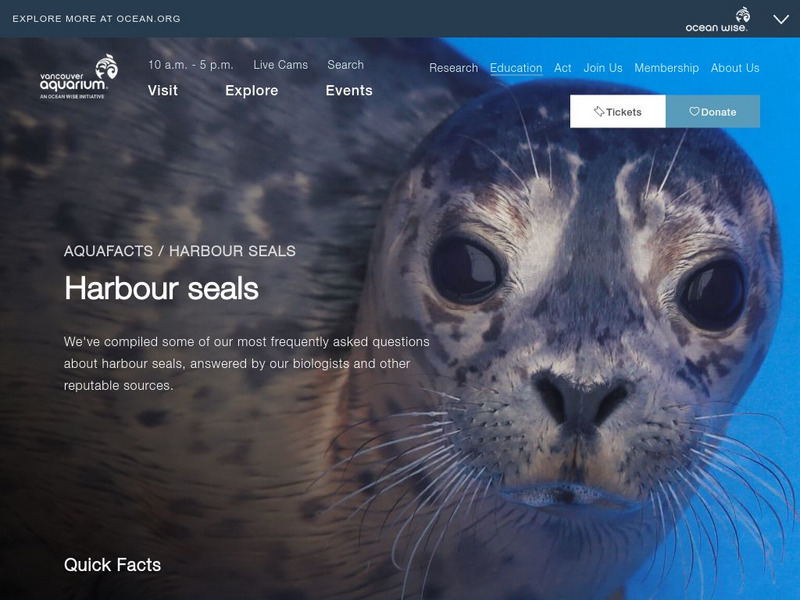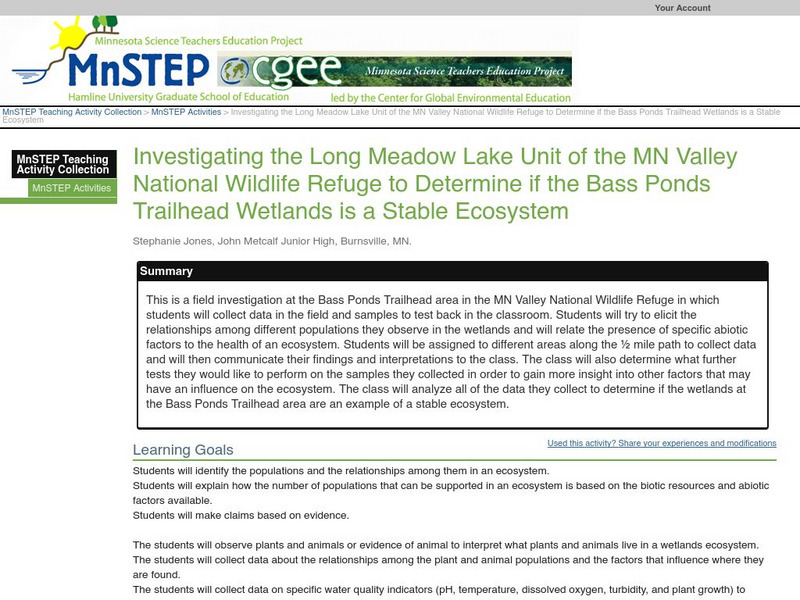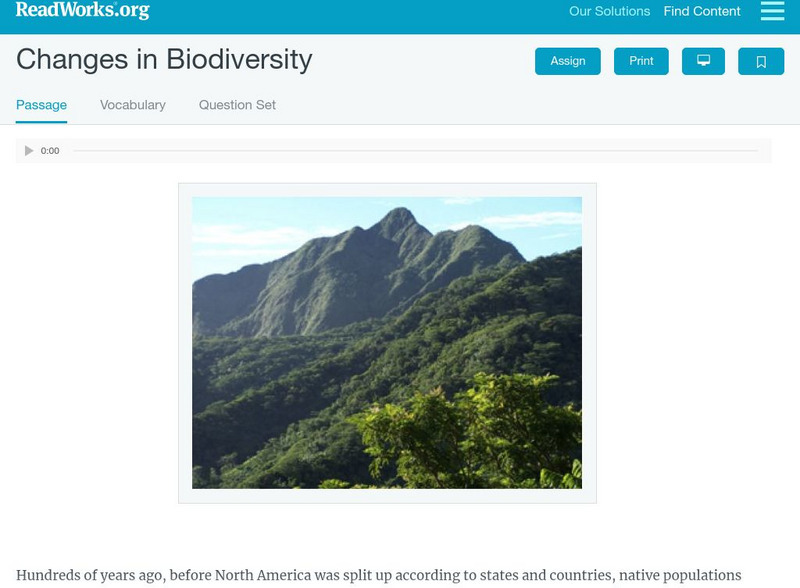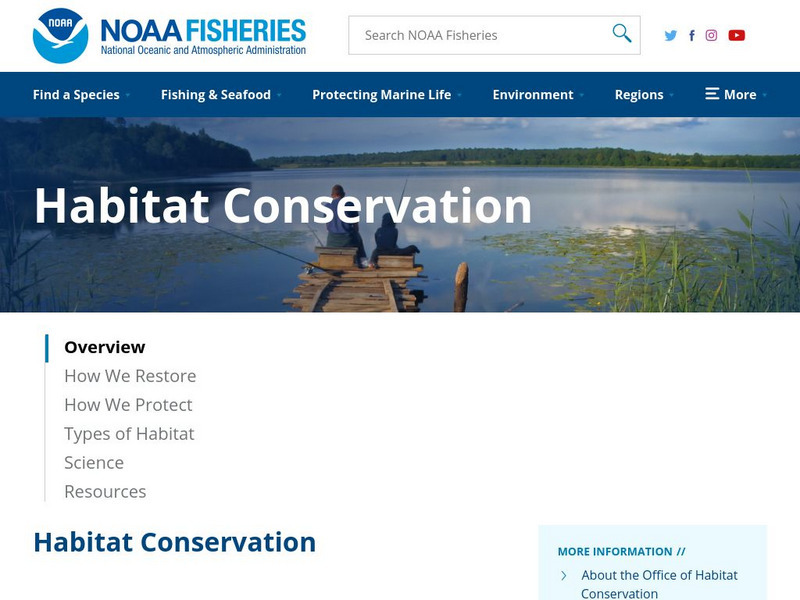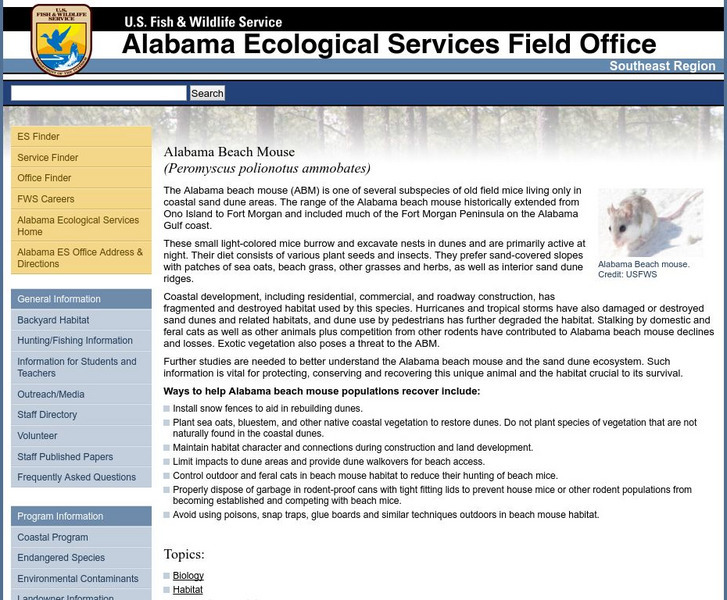Hi, what do you want to do?
Khan Academy
Khan Academy: What Is Ecology?
A webpage giving an overview of ecology. Learn about the biotic and abiotic factors that make up an ecosystem as well as the different levels of ecology.
CK-12 Foundation
Ck 12: Earth Science: Biological Communities Study Guide
Review the relationship between populations and ecosystems.
Concord Consortium
Concord Consortium: Stem Resources: Competition
An interactive activity where students study how two species of producers are affected by a consumer. By completing several virtual experiments and collecting data, students will be able to summarize what plants can do to defend...
PBS
Nh Pbs: Nature Works: Estuaries
Learn more about estuaries when you visit this informative site. This resource provides locations of and weblinks to estuaries in the United States.
Other
Temperate Forest Organization: Temperate Forest
Provides links to sites such as forestry, population, management, diversity, and fire. There are lesson plans, tours and educational links for teachers.
BSCS Science Learning
Bscs: Restoring Oyster Reefs
After learning about the role of oysters in an estuary ecosystem and a population decline that oysters have faced over time from overharvesting and pollution, students work with data to determine where are ideal sites for restoring...
BSCS Science Learning
Bscs: Restoring Oyster Reefs
After learning about the role of oysters in an estuary ecosystem and a population decline that oysters have faced over time from overharvesting and pollution, students work with data to determine where are ideal sites for restoring...
Massachusetts Institute of Technology
Mit: Open Course Ware: Courses: Civil Environmental: Ecology I: The Earth System
College-level online course highlighting the fundamentals of ecology. Course topics include coevolution of the biosphere, geosphere, atmosphere, and hydrosphere; photosynthesis and respiration; and the carbon, nitrogen, and water cycles....
Other
Pde Sas: Relationships Among Organisms
In this lesson, students compare various types of relationships among organisms (i.e., biotic interactions). Students will: explain the roles of producers and consumers, and predators and prey in an ecosystem. Explain the levels of order...
Other
Vancouver Aquarium: Harbor Seals
Are harbour seal populations endangered? What role does the harbour seal play in the ecosystem? How does the harbour seal reproduce? Find the answers to these questions and more in this enlightening site.
Science Education Resource Center at Carleton College
Serc: Investigating the Long Meadow Lake Unit of Valley Nat'l Wildlife Refuge
This is a field investigation at the Bass Ponds Trailhead area in the MN Valley National Wildlife Refuge in which young scholars will collect data in the field and samples to test back in the classroom. Students will try to elicit the...
TeachEngineering
Teach Engineering: Your River's Health
Students perform a macroinvertebrate survey to gauge the health of a local river. They collect water samples and count macroinvertebrates to learn how the health of a river's ecosystem can be determined by its river insect population.
BSCS Science Learning
Bscs: Frog Eat Frog World
Using maps and graphs of large data sets collected in FrogWatch, students will determine the range, preferred land cover, and proximity to water of the American bullfrog to figure out the bullfrog's requirements for food, water, and...
Science Education Resource Center at Carleton College
Serc: Investigating the Ecology of Goldenrod Galls Through Biological Sampling
In this biology field lab exercise, students conduct a stationary population study of goldenrod galls. They examine a host of factors including goldenrod plant density, goldenrod gall density, gall height, gall mass, larval exit hole...
Other
Digital Library for Earth System Education: Teaching Box: Seasonal Upwelling
A suite of lessons focusing on the process of upwelling. Inquiry-based exploration of seasonal upwelling includes marine food webs, food production in the ocean, wind-driven ocean currents, and seasonal changes in biotic and abiotic...
Georgia Department of Education
Ga Virtual Learning: Ap Biology: Ecology
Students review the study of living things and make connections back to Earth's systems. This unit focuses on how various species, grouped in populations and communities, work with the nonliving things around them to ensure survival.
Science Struck
Science Struck: The 6 Chief Levels of Organization in Ecology
Describes six levels of organization in the biological world - individual species, population, community, ecosystem, biome, and biosphere.
Other
Explore Learning: Food Chain Gizmo
In this ecosystem consisting of hawks, snakes, rabbits and grass, the population of each species can be studied as part of a food chain. Disease can be introduced for any species, and the number of animals can be increased or decreased...
CPALMS
Florida State University Cpalms: Florida Students: Where Have All the Scrub Jays Gone?
Learn how organisms rely on one another but also compete with one another within the same ecosystem.
Read Works
Read Works: Changes in Biodiversity
[Free Registration/Login Required] An informational text about changes in biodiversity and the chain reaction of problems they can cause. A question sheet is available to help students build skills in reading comprehension.
CommonLit
Common Lit: Book Pairings: "World Without Fish" by Mark Kurlansky
Selected (8) reading passages (grades 6-10) to pair with "World Without Fish" by Mark Kurlansky. Mark Kurlansky discusses how humans treat the oceans and the fish that live in them, and what the world will likely look like if fish...
NOAA
Noaa: Fisheries Office of Habitat Conservation
NOAA Fisheries Office of Habitat Conservation oversees the conservation of United States coastal and marine habitats. Learn about the different projects they have undertaken and supported, what the work involves, and why it is so...
PBS
Pbs Kids: Plum Landing: Invaders!
This bustling game is a race to help Plum eliminate introduced or invasive species before they crowd out the native populations.
US Fish and Wildlife Service
U.s. Fish & Wildlife Service: Alabama Beach Mouse
Read about the endangered Alabama Beach Mouse, and find out what can be done to restore its population numbers.












